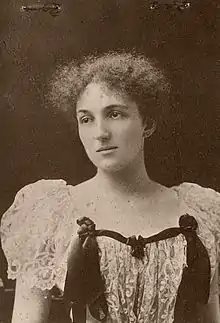Mara Belcheva | |
|---|---|
 | |
| Born | 8 September 1868 Sevlievo (Ottoman Empire) |
| Died | 16 March 1937 |
| Occupation | Poet, writer |
Mara Belcheva (8 September 1868 – 16 March 1937)[1] was a Bulgarian poet.
Life
Belcheva was born in Sevlievo. Her father was a leader of the April uprising against the Ottoman Empire. She graduated from secondary school in Veliko Tarnovo and went on to study at a women's school in Vienna. She became a teacher and taught in Ruse and Sofia.[1]
In 1886, she married Hristo Belčev, poet and economist who served as minister of finance under Prime Minister Stefan Stambolov. An assassination attempt on Stambolov claimed the life of Belčev in 1891.[1] (Stambolov himself was successfully assassinated in 1895.)
Tsar Ferdinand I was taken with Belcheva and kept a marble sculpture of her hand on his desk. He wished her to serve as lady-in-waiting to his mother, Clémentine of Orléans, but she refused a life in the palace.[2]
Belcheva went to Geneva to study philology. In 1903 she began a relationship with poet Pencho Slaveykov which lasted until his death in 1912.[1] They never married but referred to her as his "wife" throughout his writings.[3]
Belcheva began publishing verse in 1907. She published three collections of poetry: Na praga stûpki ("Footsteps on the Threshold", 1918), Soneti ("Sonnets", 1926), and Izbrani pesni ("Selected Songs", 1931). She published a biography of Slaveykov in 1925. She also translated Friedrich Nietzsche's Thus Spoke Zarathustra and Gerhart Hauptmann's Die versunkene Glocke into Bulgarian.[1]
Honors
She and Slaveykov appear on the 50 lev banknote.[4] Belcheva is the second named woman to appear on Bulgarian paper currency.[5]
References
- 1 2 3 4 5 Wilson, Katharina M. (January 1, 1991). An Encyclopedia of Continental Women Writers. Taylor & Francis. ISBN 9780824085476.
- ↑ Brill, Alida (January 1, 1995). A Rising Public Voice: Women in Politics Worldwide. Feminist Press at CUNY. ISBN 9781558611115.
- ↑ Ivanoff, Albert M. (January 1, 1947). "Pencho Slaveikov's Crypto-Autobiography". The Slavonic and East European Review. 26 (66): 209–223. JSTOR 4203925.
- ↑ "50 levs, 1999". bnb.bg. Retrieved 5 May 2017.
- ↑ Tschoegl, Adrian E. (December 1, 2004). "Change the regime – change the money: Bulgarian banknotes, 1885–2003". Balkanologie. Revue d'études pluridisciplinaires. 8 (Vol. VIII, n° 2). doi:10.4000/balkanologie.533. ISSN 1279-7952.